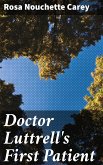In "Herb of Grace," Rosa Nouchette Carey weaves a poignant narrative that explores themes of love, sacrifice, and personal growth within the constraints of Victorian society. Through the eyes of her protagonist, the novel delves into the complexities of female independence and societal expectation, using rich, descriptive prose that evokes both the serene landscapes and the inner turmoils of its characters. Carey's literary style is characterized by her keen psychological insight and deft character development, making each interaction resonate deeply with readers, thus anchoring the novel firmly within the context of late 19th century English literature where women'Äôs roles were becoming increasingly scrutinized and defined. Carey, a prominent author of her time, was known for her keen observations of women's lives and social conditions, which were shaped by her own experiences within a patriarchal society. Growing up in a middle-class family and surrounded by the artistic and literary influences of her time, Carey was well-acquainted with the nuances of personal and social struggle. This background provided her with a unique lens through which she crafted her narratives, often illuminating the everyday challenges faced by women. "Herb of Grace" is highly recommended for readers interested in historical fiction that thoughtfully examines the intersection of personal desire and societal obligation. Carey's nuanced storytelling invites reflection and dialogue, making it an essential read for those who appreciate character-driven narratives that retain a timeless relevance.
Dieser Download kann aus rechtlichen Gründen nur mit Rechnungsadresse in A, B, BG, CY, CZ, D, DK, EW, E, FIN, F, GR, H, IRL, I, LT, L, LR, M, NL, PL, P, R, S, SLO, SK ausgeliefert werden.









